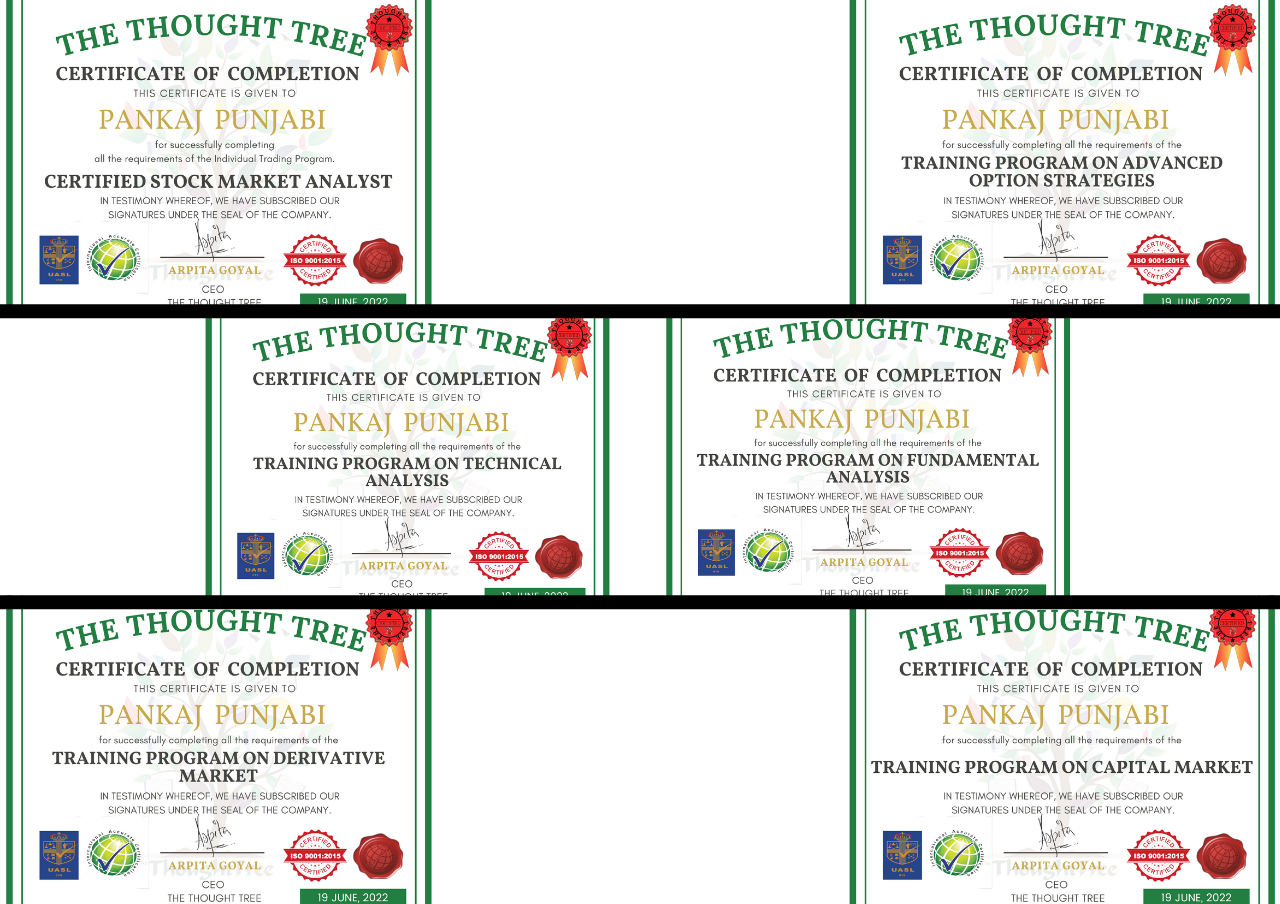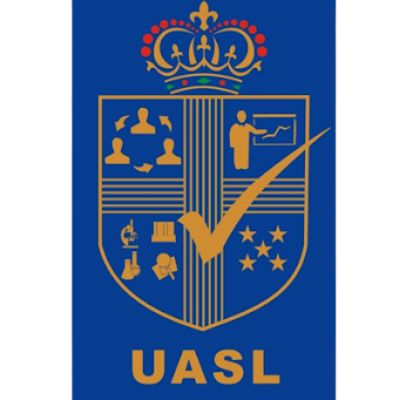Diploma in Stock Market - 1 Year
| Details | Research Analyst Course |
| Research Analyst Course Fee | |
| Duration of Research Analyst Course | 1 Year |
| Certificate | 15 Certificate |
| Batch Strength | 10-15 Students |
| Fees Installment Facility for Research Analyst Course | Available |
| Special Discount | 5% Additional Discount for Females |
| For More Details Contact | +91 9116134572 |
Why you Should Choose The Thought Tree for Research Analyst Course?
About the Research Analyst Course
Research Analyst Course is a comprehensive stock market course designed to teach you all you need to know about how the capital markets work. Equities, Initial Public Offerings (IPO), Derivatives, Technical Analysis of the Stock Market, Macroeconomics, and Financial Planning are all covered in this Research Analyst Course. It is a wonderful combination of fundamental analysis and technical analysis, which will help the investor choose the appropriate company and offer the optimal entry and exit timing and pricing through the study of charts.
The Research Analyst Course's goal is to teach students how to use stock market knowledge to make money in the equity market by providing them with theoretical and practical knowledge. When it comes to finding and analyzing firms, determining risks associated with stock investments or trades, the optimal entry and exit times of the stock, and the reasons behind market movements are all covered in this course. Doing a Research Analyst Course is a very good choice if you are seeking a job in the stock market.
Reasons to Choose The Thought Tree?
OUR APPROACH
Know Your Mentor
Testimonials
Certificate
Earn Your Certificate
The Thought Tree provides certifications after completing the Upskilling Courses. This will be proof that you have developed a skill working on projects and case studies. This will set you ahead of the competition.
Worldwide Recognised Certificate
The certificate provided by The Thought Tree is ISO certified. This certificate will be valid all over the world. You can share this certificate on Linkedin or your Resume to boost your authenticity.
Benefits of Certificates:
- Validation of Knowledge
- Increased Earning Power
- Competitive Advantage
- Improved reputation
- Boost Self-Confidence
- Respect from Peers

Course Curriculum
Basics of Economy- Micro & Macro
Overview of Indian financial market
Impacts of Monetary Policy, Fiscal policy, and Budget
The key indicator of the securities market
Product and participants
Reforms in Indian securities markets
Trading membership
Investors service cell and arbitration
Code of advertisement
Trading system, order and trade management, auctions
Clearing, settlement, and risk management
Legal framework
Fundamental valuation concepts
Case studies
Basic of derivatives
Market participants
Understanding of index
Introductions to forwards and futures
Introduction to options
Options greeks
Options strategies
Trading system
Clearing and settlement process in the derivatives market
Legal and regulatory framework
Accounting and taxation
Introduction of technical analysis
Strengths and weaknesses of technical analysis
Dow theory
Candlestick pattern
Support resistance
Head and shoulders
Double top bottom
Gap theory
Wave theory
Indicator and oscillators
Moving average
Trading strategies
Risk management
Discipline
Basic of currency markets
Major currency pairs
Foreign exchange Derivative
Exchange-traded currency
Strategies for hedging, arbitration, and speculation
Trading in currency
Risk management, Clearing, and settlement
Exchange-traded currency options
Regulatory framework
Accounting and taxation
Product participants and functioning
Derivative market
Evolution of Commodity
NCDEX MARKET
SPOT PRICE POLLING
Risk management
Clearing and settlement
Commodity Derivative
Regulatory framework
Implications of tax
Basic of options
Payoffs
Options strategies
Practicals
Introduction of fundamentals analysis
Step in fundamentals analysis
Basic definitions
Financial statements analysis
Financial ratio
Du – point analysis
Valuation methodologies
Special case of Valuation
Basic introduction of stock market
Money market and other products
Participants in the securities market
Risk management
Clearing process
Settlement process
Investors grievance and arbitration
Other services
Introduction of research analyst profession
Securities market analysis
Equity and debt market
Fundamentals of research
Behavioral finance
Microeconomics and macroeconomic
Industry analysis
Qualitative analysis
Quantitative analysis
Valuation principles
Fundamentals of risk and return
Research report
The legal and regulatory environment
Indian financial markets
Securities market segment
Mutual funds
Investment product
Risk management
Investment returns calculations
Financial planning asset allocation and investment strategy
Insurance planning
Retirement planning
Tax and estate planning regulatory environmental and ethics
Securities markets and performance
Operational aspects of financial transactions
Personal financial planning
Comprehensive financial planning
Product analysis and selection
Regulatory and compliance aspects
Case studies in Comprehensive financial advice
Introduction of mutual funds
Fund structure and constituents
The legal and regulatory environment
Offer document
Fund distribution and channel management
Accounting valuation and taxation
Investors services
Risk, return, and performance of funds
Selection of right investment
Financial planning
Model portfolio and financial plans
Financial modeling introduction
Income statement revenue modeling’
Direct cost and gross margin analysis
Working capital analysis
Forecasting income statement
Cash flow statement
Long term finance
Dividend discount model
Ratio analysis
Valuation reports
Introduction to startup
Types of entrepreneurship
Key steps of startup foundation
Customer analysis and segmentation
Product pricing
Assumption testing
Final product
Basics of CryptoCurrency
Different Types of Crypto Currencies
Understanding Block Chain Technology
Regulations and RBI Guidelines
Future of Crypto Currency
Introduction of value investing
Data filtering
Data analysis
Economics analysis
Industry analysis
Enter exit Rules
Global market introduction
Trading and investment
Trade and payment cycle
Risk management
Guide
Before the Interview- Resume writing
Once Interview is scheduled- Research the Company
Introduction to Different Types of Interview
Making a Great First Impression
Strategies for answering questions
Body Language Tips and tricks
Mock Interviews by Experts
Commonly Asked Questions
Can I meet the teachers before joining?
Yes, you can visit the institute for counselling and meeting the teachers. However, many of our teachers are also guest lecturers in universities, so please inform us before to set up a meeting with the faculty.
Is there any Fees Installment Facility?
Yes, please contact the front desk for more details.
What if I miss a class?
We strongly recommend you not to miss any class. However, in case of emergency, you can attend the missed class with another batch.
What is the procedure for enrollment?
1. Contact our front desk to know batch availability.
2. Fill up the enrollment form
3. Pay Fees
4. Collect Batch details and show up for classes.
What is the mode of Payment for fees?
We accept all types of payment. You can choose Cash Payment, Card Payment, Net Banking, and other types of payment.
Can I fill the enrollment form without visiting the office?
Yes, Call +91 9116134572 for completing the enrollment process online.
What is a Diploma in the Stock Market?
A diploma in the stock market is a course that will help you learn the fundamentals of the securities market in various modules, which cover a wide range of financial industry courses. It also covers significant aspects of market practices and developments in the field of finance. A diploma in stock market will make you job-ready.
It involves technical analysis, interpretation of distinct trends and patterns, learning to know and interpret various graphical representations used throughout the stock market, trying to perform thorough research on corporates, sectors, examining different financial derivatives to help you to make educated decisions, and maintaining a diversified portfolio.
Importance of Diploma in the Stock Market?
Training in the stock market necessitates a thorough knowledge of the market's many facets. This diploma in stock market helps you learn about instruction on the fundamentals of the financial markets, including laws, regulations, frameworks, and strategies. As each talent builds on the previous one, leading to a formidable level of proficiency, a diploma in stock market can help you gain overnight success as a trader.
Stocks, shares, or equities aren't the only thing to consider while investing in the stock market. Mutual funds, dividends, currencies, bonds, and derivatives all fall under this umbrella term. A diploma in the stock market course is important as it helps in learning about investing in the stock market and teaches you how to use all of these financial products to diversify your portfolio. As a result, you can develop a diversified portfolio by learning all of the financial instruments by doing a diploma in stock market.
Your attitude to trading and investing in the stock market is critical to your long-term success. To maximise profits, many people spend large sums of money in the stock market with the assistance of tips or by following experienced traders or investors. Such a strategy, on the other hand, is shortsighted. So, in order to learn the perfect strategy to invest, it becomes important for you to join a diploma course in stock market.
As a result, a strategy based on thorough study and confident judgments based on reliable market information increases your prospects for success. These training schools help you cultivate this mindset by teaching you about stock markets through their courses.
Who should do a Diploma in the Stock Market?
"When you stop learning, you begin to die," Albert Einstein famously said. The human mind is designed to be flexible and adaptable to new situations. There is nothing else like learning new things in the world.
Beginners to stock trading have a steep learning curve since they lack a fundamental understanding of the stock market's processes and terminology, and they must join a diploma course. Before investing large sums of money in the stock market, it is important to understand its many dimensions. Therefore, those who are at an intermediate level in the stock market world can also join diploma in stock market course. If you want to do a job in stock market, then this is the perfect course for you.
Additionally, since a person's experience, location, and other factors are not a factor in determining their eligibility to participate in the trade market, anyone desiring to engage in stock trading can do so without hindrance or connection. However, proper technical instruction, in-depth knowledge of trading strategies, and a strategy for mitigating risk are crucial. Prior to entering the live market and starting to trade, this step is critical.
Career Opportunities after Diploma in the Stock Market?
Stockbroker
Trading and investing in the stock market necessitate a Trading and Demat account, which is provided by your broker, as you may already be familiar with. Taking a sub-broker ship from such a current broker is a good way to get your feet wet. In this scenario, all you have to do is sell the prospecting consumer the brokerage account to make money. Become a sub-broker, and you'll be on your way to financial freedom in no time.
Financial Advisor/Investment Advisor
Investment adviser certification and a consulting business are also possible in this Market. A certified financial planner can provide their skills as a consultant or represent their firm in providing financial planning services to corporations and individuals. This certification test is mandatory for those who want to become SEBI-registered financial advisors. You could apply to SEBI for an Investment Advisory licence if you fulfil all of the requirements set out by SEBI.
Management of a Portfolio
It is important to know that your mutual fund investments are being handled by Portfolio Managers that have a proven track record of success. Wealth management organisations in India employ Fund Managers to manage the assets of their customers. If you have a good grasp of financial markets, portfolio management is the best job choice. To enter this industry, professional qualifications like CA, CFA, and MBA (Finance) are necessary. If you would like to be a Portfolio Manager, you must first get research & marketing expertise before moving on to Portfolio Management.
Analyst of Equity Research
If you're considering a career in the stock market, being an equity research analyst might be a highly rewarding choice. There are two types of research in the stock market: buy-side and sell-side, and both require equity research analysts. For fund management, the buy-side invests and buys a substantial share of stocks, whilst the sell-side deals in marketing, creation, and sales of stocks to the market. Becoming an equity research analyst, you can pursue either the CFA or CA designations, which are often regarded as the best credentials for the job.
Why should you do a Diploma in the Stock Market?
If you want to get expertise on anything like budget and financial control specialists, private equity analysts, portfolio managers, fixed income analysts, hedge fund managers, investor relations managers, internal auditors and specialists in financial operations, you should do a Diploma in the stock market. Upon completing this programme, you will be able to demonstrate a high level of expertise to your coworkers and clients, and they will be well-positioned for advancement into positions of more responsibility.
Depending on your interests and credentials, the stock market offers a wide range of job choices. A thorough understanding of the financial markets is essential for stock market success. More crucial than academic or professional credentials is actual experience in the financial sector. You have a wide range of options in the stock market, but your success mostly depends on your ability to communicate effectively and analyse data.
What will you get after you complete your Diploma in the Stock Market?
More than a dozen academic certifications.
A total of 15+ certificates may be readily obtained. As a result, the employment market will reward you handsomely. For perhaps the first time, an Indian institution offers a Diploma Course with more than 15 different certificates.
Internships are a guarantee
In the diploma in stock market course, you get an assured Internship opportunity at T3 or one of its partner companies. Graduates can apply what they've learned in the classroom to real-world situations.
Lifetime Support
After completing your diploma in stock market, you'll have access to an unlimited number of T3 classes for the next year as part of your membership. Even after the membership, if you want any help, we are always there to help you.















